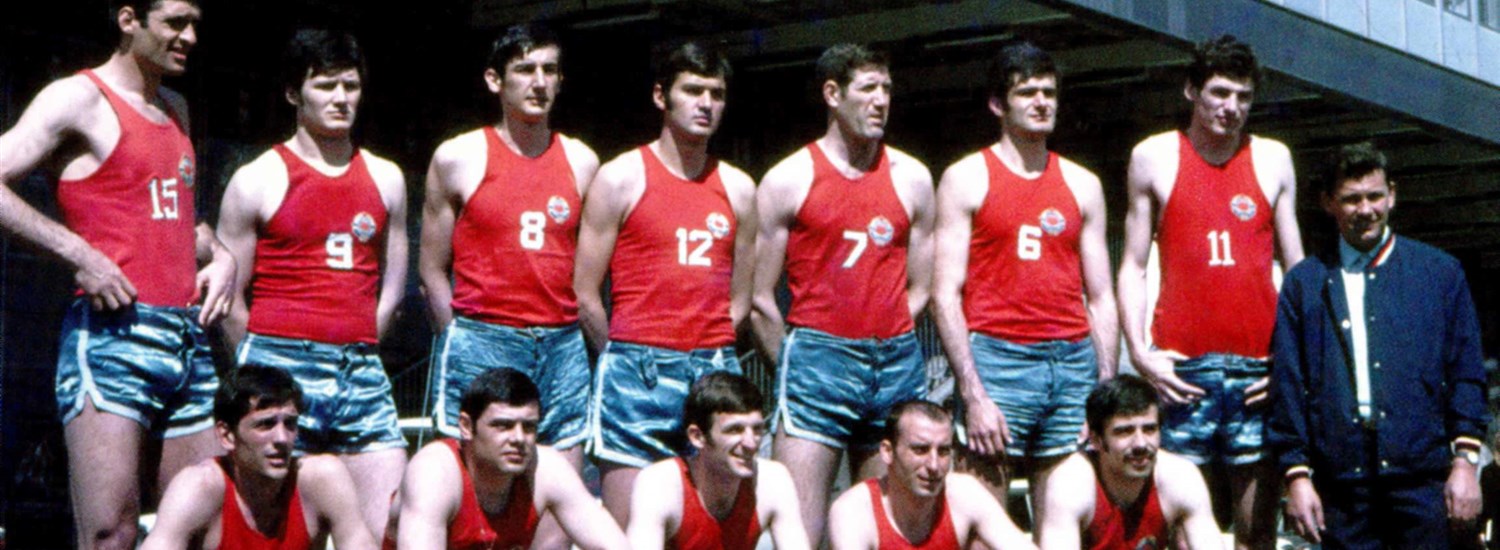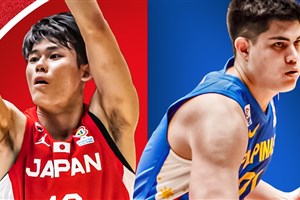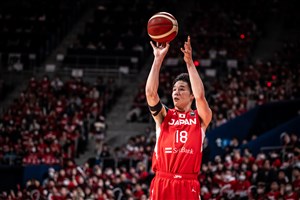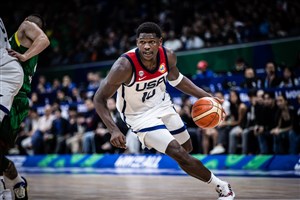
The Best of 1970 World Cup: Yugoslavia claim first title as Europe's first host; Brazil second, Soviets third; super scorer Shin Dong-pa
MIES (Switzerland) - The FIBA Basketball World Cup took place in the Northern hemisphere for the first time in 1970 with Yugoslavia welcoming the globe to Ljubljana. After taking second place in the previous two World Cups, Yugoslavia climbed to the podium's top step for the first time in front of the home fans.
Yugoslavia were joined on the podium for a third consecutive World Cup by Brazil and Soviet Union, who finished second and third respectively. It was the third time that the host country claimed the title following Argentina in 1950 and Brazil in 1963.
The best team: Yugoslavia
| Rank | Team | W-L |
| 1. | Yugoslavia | 5-1 |
| 2. | Brazil | 7-2 |
| 3. | Soviet Union | 7-2 |
| 4. | Italy | 5-4 |
| 5. | USA | 6-3 |
| 6. | Czechoslovakia | 4-5 |
| 7. | Uruguay | 2-7 |
| 8. | Cuba | 6-2 |
| 9. | Panama | 4-4 |
| 10. | Canada | 3-5 |
| 11. | Korea | 4-4 |
| 12. | Australia | 1-7 |
| 13. | United Arab Republic | 0-8 |
After hosting the first five editions of the World Cup, known at the time as the FIBA World Championship, in South America, FIBA moved the 1970 spectacle to Europe with Yugoslavia as hosts from May 10 to 24. The First Round games were played in Sarajevo, Split and Karlovac with Ljubljana hosting the Final Round and the Classification 8-13 action played in Skopje.
For the fourth consecutive World Cup, 13 teams participated: hosts Yugoslavia, Olympic champions USA; Soviet Union and Czechoslovakia from FIBA EuroBasket 1969; Brazil and Uruguay from the South American Championship; Panama and Cuba from the CentroBasket; Asian Championship winner Korea; and African continental champion United Arab Republic (Egypt's official name from 1958 to 1971). The three remaining spots were filled by the invited teams Italy from Europe, Canada from the Americas and Australia from Oceania.

Yugoslavia received a bye into the Final Round while the other 12 nations were divided into groups of four with the top two from each group reaching the Final Round as well. The last two of each group joined and played classification for 8th to 13th place.
USA, Brazil and Soviet Union all went undefeated in their respective Preliminary Round groups with Czechoslovakia, Italy and Uruguay taking second places in the groups.
 Brazil vs. Soviet Union
Brazil vs. Soviet Union
The first day of the Final Round saw Yugoslavia struggle to beat Italy 66-63 thanks to 27 points from Kresimir Cosic; while Brazil downed Soviet Union 66-64 after trailing by 11 points at halftime. Brazil followed that with a 69-59 win over Italy but the two-time world champions from South America were no match for Yugoslavia in an 80-55 loss.
USA suddenly looked like a real podium contender as they fought past Soviet Union 75-72 with Kenny Washington scoring 18 points in the Americans’ sixth straight victory. But USA crashed to three consecutive losses, starting with a 66-64 defeat against Italy. That came the same day Brazil dropped their second game - 72-71 versus Czechoslovakia.
 Yugoslavia's Petar Skansi after winning the title
Yugoslavia's Petar Skansi after winning the title
The Americans would end up playing in the deciding game - the final contest of the penultimate day against the hosts. With Brazil and Soviet Union already strapped with two losses, undefeated Yugoslavia knew it would lock up the title with a victory over USA. Cosic poured in 15 points and Petar Skansi added 14 in a 70-63 win, and the Tivoli hall in Ljubljana broke out in celebrations - as well as the rest of the country.
The only decision left on the final day was who would join Yugoslavia on the podium. Brazil beat USA 69-65 for second place, and then Soviet Union raced past Yugoslavia 87-72 to lock up third place.
 Marques Wlamir (BRA), Ivo Daneo (YUG) and Modestas Paulauskas (URS)
Marques Wlamir (BRA), Ivo Daneo (YUG) and Modestas Paulauskas (URS)
The best player: Sergej Belov MVP
For the second straight tournament, the Most Valuable Player of the World Cup did not come from the winning team as Sergej Belov of Soviet Union claimed the honors. Belov had already become a superstar in basketball. The 26-year-old helped Soviet Union to the FIBA EuroBasket 1969 title as MVP and he guided CSKA Moscow to the FIBA European Champions Cup crown in 1969.
At the 1970 World Cup, Belov was not needed much in the Preliminary Round - scoring just 19 combined points in three blowout wins. He netted 10 points in the Soviets' devastating loss to Brazil but did all he could with 24 points in a loss to USA. Belov finished with 19 points in the win over Yugoslavia and was second-leading scorer on the team with 11.3 points behind only Modestas Paulauskas' 11.4 points per game.
 Kresimir Cosic
Kresimir Cosic
Belov was joined on the All-Tournament Team by his teammate Paulauskas, who made the All-Tournament Team in 1967 as well; Kresimir Cosic from champions Yugoslavia, Brazilian Ubiratan Pereira and Kenny Washington of USA.
The best game : Yugoslavia vs. USA
Yugoslavia were almost there - the hosts were just one victory from their much-anticipated title. All they had to do was beat USA in the penultimate game and no other nation could overcome them. The 8,000 fans in Ljubljana came up with the chant: "Keep your moon, we'll take the gold," - referring to the Americans having landed on the moon in 1969.

Yugoslavia went ahead 35-32 at halftime. Over the course of the game, play twice was interrupted to clear the playing floor of debris that spectators had thrown. Yugoslavia would eventually win 70-63 and Kresimir Cosic, who was a sophomore at Brigham Young University in the USA, led the way with 15 points. Petar Skansi scored 14 points and Nikola Plecas added 12 points. Mike Silliman paced the Americans with 16 points.
The best story: Italian step forward with 20-year-old Meneghin
Italy had been in Yugoslavia for a third straight World Cup appearance - and second as an invited team. The Italians went winless in the Finals Round in 1963 and finished 7th and then missed out on the winners group altogether in 1967 and took 9th place.
Italy showed they had taken a step forward in 1970, nearly beating Yugoslavia (66-63) in the first game of the Final Round. After losing to Brazil, Italy beat Czechoslovakia (89-77) and Uruguay (76-65) before upsetting previously undefeated USA 66-64. And the Italians would end up losing to Soviet Union by only 4 points - 62-58. In the end, Italy would take 4th place.
 Future Hall of Famer Dino Meneghin
Future Hall of Famer Dino Meneghin
One of the team's top young leaders was a 20-year-old Dino Meneghin. The future Hall of Famer averaged 10.8 points - ranking third on the team - with 15 and 13 points in the two games against Brazil and a team-high 16 points against Soviet Union. The center would later help Italy win the silver medal at the 1980 Olympics and take the title at the FIBA EuroBasket 1983.
The best performance: Shin Dong-pa
The 1970 World Cup witnessed one of the greatest scoring performances in the competition's history. And the man pouring in all the points was Shin Dong-pa of Korea. He finished the tournament averaging 32.6 points per game. The second-best scorer was Omar Arrestia of Uruguay at 19.7 points.
 Shin Dong-pa (No. 7)
Shin Dong-pa (No. 7)
Shin's production put him in the same sentence as two of the greatest scorers in world basketball history: Nikos Galis of Greece and Brazilian Oscar Schmidt. Shin's 32.6 points average ranks third all-time in World Cup history behind Schmidt's 34.6 in 1990 and Galis' 33.7 in 1986.
Shin was amazing all tournament, opening the competition with 40 points versus Brazil. He followed that with 39 points against Canada, netted 36 against Panama and torched Cuba for 41 points. The latter was the second-best single scoring game in World Cup history until then - topped only by Ricardo Duarte's 42 points for Peru against Japan in 1963.
Stats leaders
Scorers
| Player (country) | Points Per Game |
| Shin Dong-pa (Korea) | 32.6 |
| Omar Arrestia (Uruguay) | 19.7 |
| Pedro Rivas (Panama) | 18.8 |
| Davis Peralta (Panama) | 18.8 |
| Jiri Zidek (Czechoslovakia) | 18.6 |
| Pedro Chappe (Cuba) | 17.9 |
| Lee In-pyo (Korea) | 17.8 |
| Kresimir Cosic (Yugoslavia) | 17.3 |
| Luiz Claudio Menon (Brazil) | 16.9 |
| Bob Molinkski (Canada) | 16.8 |
FIBA
















_d088e077-15a0-448f-b143-4b4d97c09bc7.png)




























